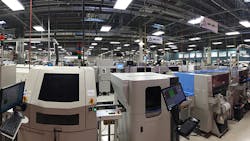2015 IW Best Plants Winner: Lean Thinking in Action at ATS Corp.
Tucked into a quiet industrial park in Everett, Wash., Applied Technical Services (ATS), is a plant in rapid lean transition.
Two years ago, this privately-owned maker of circuit card assemblies and electronic box build products had a basic understanding of lean methodologies and basic six sigma tools, but little work had been completed to apply them to production. Matters of process flow, visual indicators, and waste had been ignored in the day-to-day work of the factory. And ATS paid the price for that in efficiency, quality and profitability.
"There was a lot of chaos in what we did then," recalled Fatima Abdelkafi, engineering manager at ATS. "There was a lot of unnecessary work going on."
You would hardly guess that touring the plant today.
The 65,000-square-foot facility today is a brightly lit, clean and streamlined system—a giant circular flow of activity that circuits each piece of production logically and carefully through every step of the process all the way from raw materials to testing and packaging. The 160 workers scattered through the plant casually discuss muda and flow-through, tossing around lean terms and principles like seasoned Black Belts.
This dramatic change began in February 2014 with the hire of Master Black Belt Don Doody as chief operating officer.
Doody brought with him a rare wealth of experience in the kind of turnaround ATS needed. In the 1990s, Doody worked at General Electric during CEO Jack Welch's famous mandate that every GE employee be Six Sigma certified.
Applied Technical Services Corp.Everett, Wash. Employees: 158, non-union Total Square Footage: 65,000 Primary Product/Market: Electronic Assemblies Start-up Date: 1985 Achievements: 50% improvement in first pass yield in 3 years; $73,000 savings generated from improvement programs/ projects since 2014.
|
In an insane, two-year frenzy, Doody estimates that he trained somewhere between 800 and 1,000 Black Belts at the company. Since then, he has grounded those skills with intense lean training across multiple corporations, including 2010 IW Best Plants winner, IEC Electronics Corp.
He brought that experience to ATS with a clear vision in mind.
"To make this plant better, I knew I had to get people thinking properly about continuous improvement," he said. "They had to understand what waste is and they had to learn to see it on their own."
To start the process, Doody worked with Abdelkafi and her team to create a custom lean training program based on Jim Womack's "Lean Thinking" technique, rather than just focusing on Six Sigma tools.
"I don't care how good you are at the tools, unless people are thinking lean it's going to be very hard to make progress," Doody said. "You've got to get the brain waves aligned with this way of thinking."
To help reinforce this principle, Doody personally walks the Gemba every day, spending at least 10 minutes talking face-to-face with every single worker on the floor.
"Social engagement is critical," he said. "This is how you get people to really see waste, to actually want to learn and to improve it."
If the plant's results are any indication, it looks like he achieved this goal in short order.
In the past three years, ATS has increased its first-pass yield rate by 50% and has saved over $73,000 in improvement projects over the last year alone--$35,000 of which came directly from employee suggestions.
Despite these rather staggering results, Doody adamantly denies credit.
"This story isn't about me; all I did was help get lean thinking inside everyone's head here," he said. "These people are totally engaged. They are proud of what they do and they are the ones that have accomplished these results."
That is easy to see.
Standing in front of a row of otherwise immaculate machines running at the edge of the plant, I caught SMT Supervisor Pete Van rubbing his chin, staring hard at a few scuffmarks on the floor left by some heavy carts that are wheeled across the spot every day.
"This is next," he said. "What is causing this? Why is it happening? How can we change it? That's my next mission."
About the Author
Travis M. Hessman
Editor-in-Chief
Travis Hessman is the editor-in-chief and senior content director for IndustryWeek and New Equipment Digest. He began his career as an intern at IndustryWeek in 2001 and later served as IW's technology and innovation editor. Today, he combines his experience as an educator, a writer, and a journalist to help address some of the most significant challenges in the manufacturing industry, with a particular focus on leadership, training, and the technologies of smart manufacturing.
